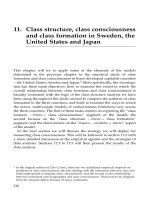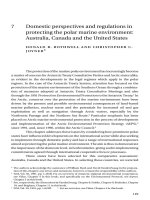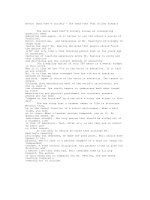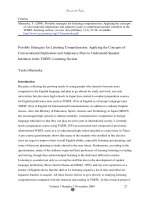Trust building in sales the risky technique that will fast track you to trusted advisor status
Bạn đang xem bản rút gọn của tài liệu. Xem và tải ngay bản đầy đủ của tài liệu tại đây (1.5 MB, 57 trang )
The secret ingredient of
Trust-Building
in Sales
The risky technique that will fast-track
you to ‘trusted advisor’ status
If you’re reading this,
it means you care
about sales.
If you’re reading this,
it means you care
about sales.
(That probably makes you a good rep.)
But many good reps stop short of being great
— because they’re missing a key ingredient:
Reps that are consistently
trusted by clients and prospects:
Close
deals faster.
A trusted rep needs less time
to get proposals considered
and accepted.
Spend less
time chasing
business.
A trusted rep doesn’t have to
wait for RFPs; clients actively
contact them for advice.
Create more
opportunities.
A trusted rep gets more
referrals to customers’
colleagues and contacts.
So far, so obvious.
But there’s
one key element
of trust-building
that almost
everyone fails
to apply.
TRUST.
And because
they don’t apply it,
they miss out
on the biggest
and best
opportunities.
TRUST.
Think of how you worked to develop trust
in your last sales engagement.
Think of how you worked to develop trust
in your last sales engagement.
You probably:
Think of how you worked to develop trust
in your last sales engagement.
You probably:
Engaged with the prospect
Think of how you worked to develop trust
in your last sales engagement.
You probably:
Engaged with the prospect
Listened to their challenges
Think of how you worked to develop trust
in your last sales engagement.
You probably:
Engaged with the prospect
Listened to their challenges
Framed their challenges in a rational way
Think of how you worked to develop trust
in your last sales engagement.
You probably:
Engaged with the prospect
Listened to their challenges
Framed their challenges in a rational way
Envisioned a future in which these challenges were solved
Think of how you worked to develop trust
in your last sales engagement.
You probably:
Engaged with the prospect
Listened to their challenges
Framed their challenges in a rational way
Envisioned a future in which these challenges were solved
Committed to delivering a solution.
Think of how you worked to develop trust
in your last sales engagement.
You probably:
Engaged with the prospect
Listened to their challenges
Framed their challenges in a rational way
Envisioned a future in which these challenges were solved
Committed to delivering a solution.
These are all great ways to build trust
with your clients and prospects.
But if you only do these five things,
you’re not building the kind of trust
that keeps clients coming back to
you time and again.
Here’s why:
Business
decisions are
never purely
rational.
They’re made by people with
normal, human fears, worries
and insecurities.
Lots of
challenges
remain
unspoken.
Almost every complex sales
situation has at least one
‘elephant in the room’.
Your role is
not just to
provide a
logical solution.
Prospects secretly want help with their
emotional and political issues, too.









